


Build Independence With Occupational Therapy in Perth
At Perth CDC, we offer occupational therapy in Perth to help children build confidence and independence. Therapy focuses on play-based learning and practical skills that support daily routines at home and school.

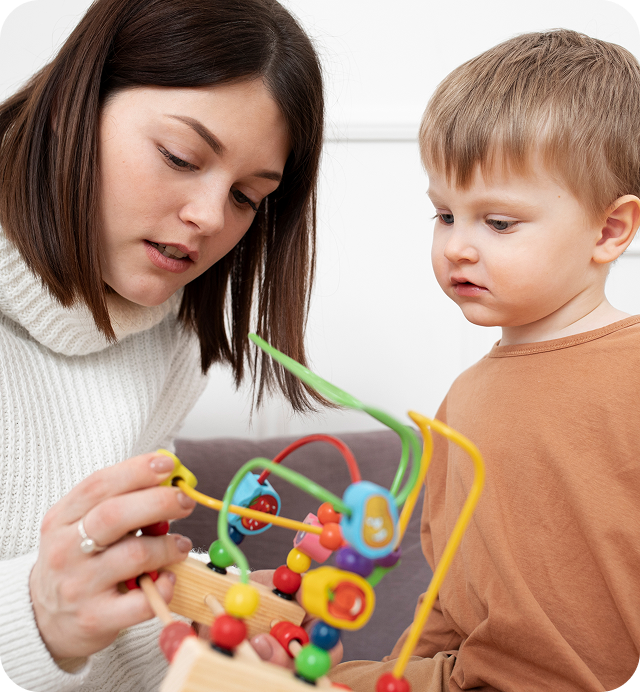

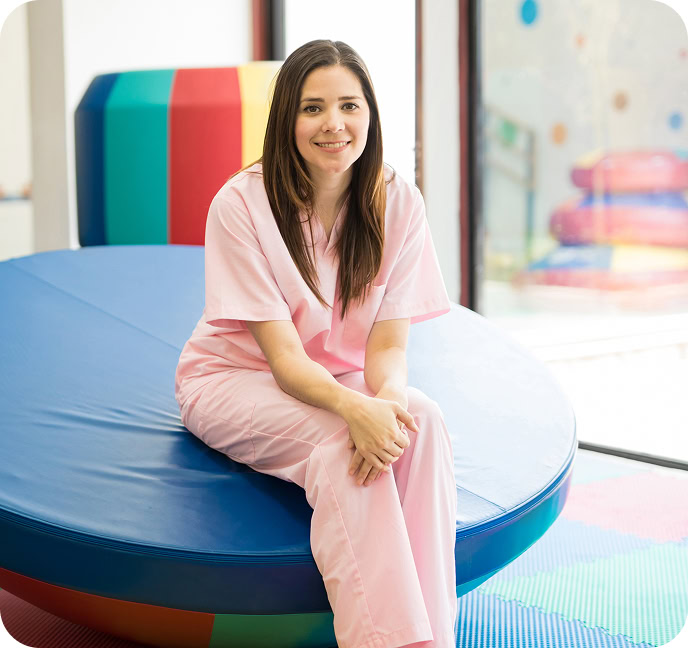
Supporting Daily Function Through Skill-Building and Play
Children often learn through play, and occupational therapy uses these opportunities to build practical skills for daily life. Therapy focuses on movement, coordination, emotional regulation, fine motor development, and self-care routines. Sessions are engaging, hands-on, and individually tailored to each child’s strengths and needs. Parents and carers are involved every step of the way. Therapists work collaboratively to promote confident participation at home, in the classroom, and throughout the community.
Candidate
Signs Your Child May Benefit From Occupational Therapy
It’s not always easy to tell when a child needs extra support. Occupational therapy may help if certain tasks or situations seem unusually hard or stressful for your child. Below are a few signs that could suggest they’re finding it tricky to manage everyday routines or environments.
- Struggling with dressing, feeding, or using cutlery may suggest difficulty with daily tasks. These challenges can reduce a child’s independence and impact their confidence during daily routines.
- Trouble with handwriting, using scissors, or grasping small objects may signal fine motor delays. Occupational therapy can help build coordination and support skills in school and self-care.
- Strong reactions to sound, touch, or movement may indicate sensory processing difficulties. These sensitivities can make transitions or everyday environments feel overwhelming or upsetting.
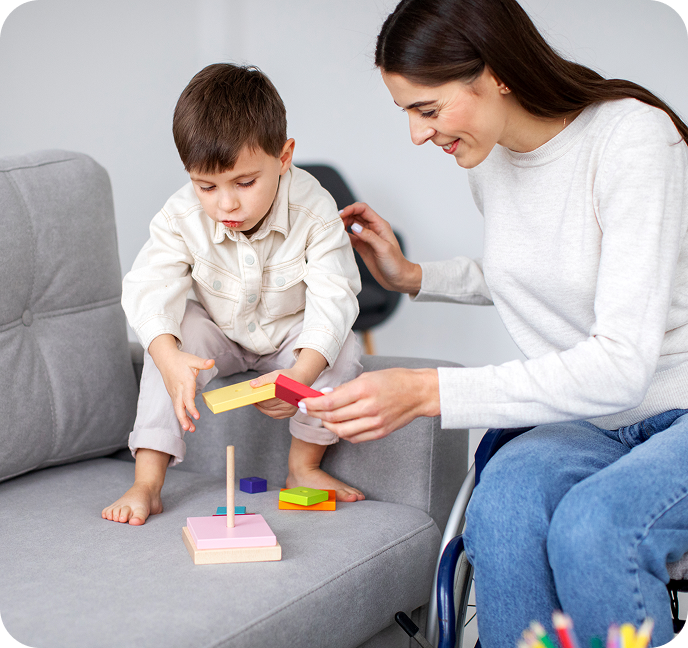
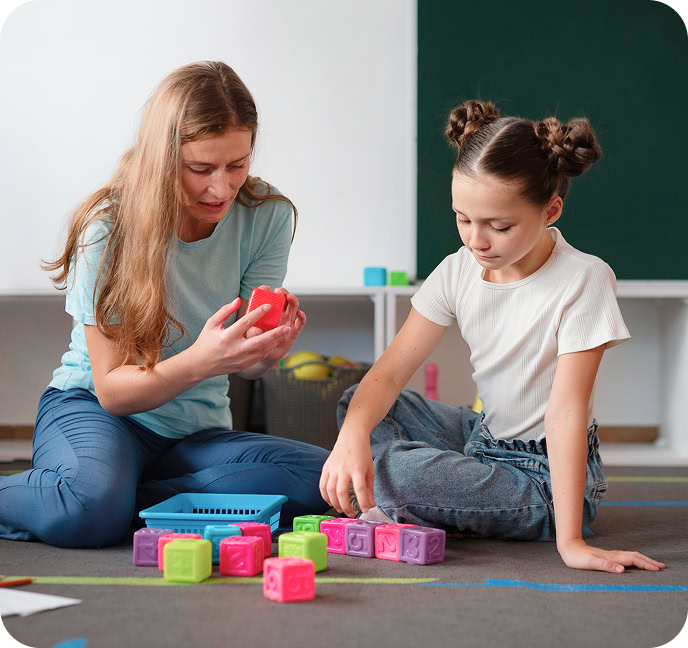
Benefits
The Benefits of Occupational Therapy in Children
When children face hurdles in daily life, occupational therapy offers targeted support to help them overcome challenges. It focuses on building core capabilities over time. Below are a few distinct benefits that reflect how therapy can positively influence a child’s overall well-being, emotional development, and participation in everyday environments.
- Therapy builds planning and organisation skills. Children learn to follow tasks such as packing bags or brushing their teeth. This supports smoother daily transitions and routines.
- Children develop persistence through hands-on challenges. They practise coping with mistakes and trying again. This helps build emotional flexibility and confidence in learning new skills.
- Improved spatial and body awareness makes movement safer and more controlled. Children feel more confident navigating stairs, climbing, or playing physical games with peers.
Book an Occupational Therapy Session at Perth CDC
Tailored therapy supports your child’s development in everyday life. Contact Perth CDC to arrange an appointment with an experienced paediatric occupational therapist.
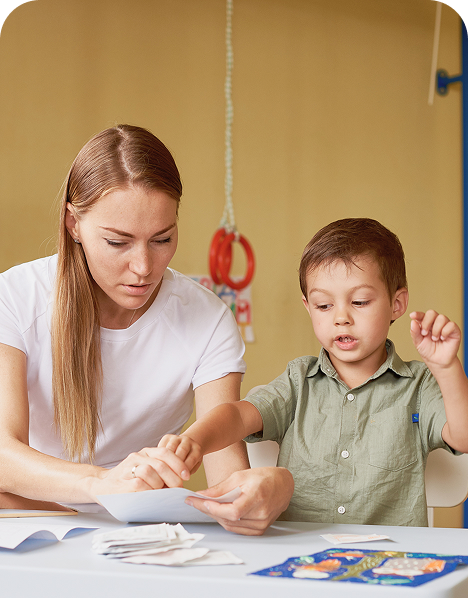




Why Families Choose Our Occupational Therapy Services
When everyday activities feel challenging, such as dressing, writing, or coping with change, our occupational therapists offer gentle, practical support to help children participate more confidently in their daily lives.
Helping Children Build Everyday Independence Skills
We focus on the everyday tasks that help children feel capable, like getting dressed, using cutlery, writing, or managing routines. Our therapists gently guide children through these skills using a combination of structured activities and playful learning. Each plan is tailored to suit your child’s needs, pace, and interests. With time, we aim to support not only skill development but also improved confidence and participation in home, school, and community life.
Supporting Sensory Needs in Meaningful, Practical Ways
Some children experience the world through a more heightened or reduced sensory lens. Sounds, textures, or movement may feel overwhelming or not noticeable at all. Our OTs help identify how sensory processing affects your child’s behaviour, comfort, and focus. We work with families to develop simple strategies that support regulation and daily participation, making environments and routines more manageable and enjoyable for your child.
Therapy That Feels Encouraging, Safe and Engaging
Every child is different, so our therapy sessions are flexible and creative. We build rapport through play, choice, and gentle encouragement, allowing your child to feel relaxed while developing key life skills. We adjust our approach based on how your child engages each day, always aiming to make the experience feel rewarding and safe. It’s about progress—without pressure—in a space where children feel seen and valued.
Working in Partnership With Families and Educators
You know your child best, and your insight matters. We work closely with families to understand concerns, celebrate wins, and develop plans that feel realistic and sustainable. Our team also connects with teachers and other professionals when appropriate, helping your child feel supported across different settings. This consistent, collaborative approach gives your child the best chance to succeed in the activities that matter most to them.




Get to Know the Dedicated Professionals Behind Your Child’s Care

PAEDIATRICIAN | MBBS, MD, FRACP
Dr. Feng brings experience as a consultant paediatrician with a focus on developmental and general medical concerns. Her approach is calm, attentive, and family-focused.

DIRECTOR AND MEDICAL LEAD | MBBS, DCH, FRACP, GCAD
As co-founder and senior paediatrician, Dr. Karande manages care for children with autism, ADHD, and behavioural concerns. He is ADOS‑2 trained and experienced in developmental paediatrics.

CONSULTANT PAEDIATRICIAN | MBBS, FRACP
Dr. Chawla is a general paediatrician who manages acute and chronic childhood conditions. Her interests include feeding issues, eczema, asthma, and developmental care.

DIRECTOR | BSc (Hons) Speech and Language Pathology
Claudia is a speech pathologist who works with children with speech, language, and communication needs through engaging, individualised sessions that build skills and confidence.

DIRECTOR | MClinPhysio (Curtin), BSc Physiotherapy
Simone, a paediatric physiotherapist, helps children build strength, balance, and coordination using fun, movement-based therapy to promote functional everyday development.

SPEECH PATHOLOGIST | BHLTHPROM, GRADDIPPSYCH, BSPPATH

PSYCHOLOGIST | BA SC (PSYCH), (HONS), MPSYCH

OCCUPATIONAL THERAPIST | BOccTher, BExSc
Jasmine Berlingeri has a background in exercise science and occupational therapy. She uses creative and supportive approaches to assist children in developing skills and strengthening family involvement in daily activities.
What Families Say About Their Perth CDC Experience
Parents often share that they feel supported, understood, and genuinely cared for. Their feedback reflects the strong, trusting relationships that have been built between families and our team.
Thank you Perth CDC for your kind and empathetic receptionist Hetal and wonderful, professional Dr Amruta Pendse for caring for my son. I am forever grateful for your guidance and support. I would highly recommend Perth CDC to any mother, parent, guardian or family.
Dr Karande made my child & myself feel very comfortable. We have had our initial session so far & he was thorough & did not rush us (even though we were late with traffic.. ) Also Hetal who runs the office was very kind & organised an appointment promptly.
Doctor Karande is an amazing Paediatrician I have never met anyone like him before. His caring and understanding, very thorough with his work. Will listen to your concerns and take every precautionary measure. I highly recommend Dr Karande to anyone who needs to see a paediatrician.
Dr Karande is a supportive and caring practitioner who has been a great support to our family from childhood and through teenage years. We couldn’t recommend Perth CDC more highly. Hetal has also been amazing in working through appointment requests and helping to make a sometimes stressful process, very easy.
This clinic have been amazing for my children’s assessments and appointments. Dr Karande really invests time to connect with the children and assess them genuinely. We have also seen Dr Pendse who has been very supportive and listens to the needs of my child, as well spending time to answer my questions and explain things clearly.
Perth CDC has been beyond amazing with my children. The care and compassion Indi and Hetal have shown us as a family is to the highest standard. I can not recommend Perth CDC enough and words can never express how much they have helped us. My children’s growth under their care has exceeded my expectations.
Highly, highly recommend Dr Kerande. What an exceptional paediatrician. We sought him out to assess my siblings to see if they have ADHD – he was not only thorough, but reassuring and well knowledged. He is also brilliant at building rapport with children. Cannot thank him enough and I don’t hesitate to recommend him to others. Thank you, Dr Kerande!
Dr Karande was very efficient and really took the time to listen to our concerns and we finally got a diagnosis.
Great service, patience and understanding from Hetal to Dr I. Karande. I know my son is in safe hands. Keep it up!!!
Dr Amruta Pendse has been empathic and thorough when helping my son and I with his ADHD diagnosis and treatment. Dr Amruta is very approachable and understanding and it’s great that I’m able to email with updates or concerns and receive a prompt response to my questions. Would highly recommend Dr Amruta Pendse and Perth CDC if your child is needing a paediatrician.
Dr Karande, Monika and Hetal are the most kind and caring group of people I’ve had the pleasure of working with for my daughter who has ASD and ADHD. The staff always make you feel welcome and ensure they provide the best care possible for your child. We have been coming to Perth CDC for 3 years and will continue to come here.
Thank you for the best experience! Could not fault paediatrician Indrajit S Karande. He was really friendly and made sure my husband and myself were able to spend moments after the birth with our son. He was thorough and made sure our baby was safe and healthy! It was such a nice experience. I highly recommend Perth CDC.
Frequently Asked Questions
Parents and carers can explore answers about therapy, daily life skills, early learning, and developmental support for young children.
What does an occupational therapist do for children?
A paediatric occupational therapist (OT) helps children develop practical skills needed for everyday life. This includes support with learning, play, and independence at home, school, or in the community.
- Daily living skills for kids:
A paediatric OT helps children develop independence in daily tasks such as feeding, dressing, and using the toilet. - Fine motor skill development:
Therapy helps improve hand movements needed for writing, using scissors, or managing buttons and zippers. - Sensory integration therapy:
Some children may be sensitive to certain types of sensory input, such as noise, touch, or movement. Occupational therapy for children employs strategies to help individuals feel calmer and more at ease in various environments. - Social and emotional skills:
Occupational therapists (OTs) assist with attention, emotional regulation, and encouraging positive social interactions. - Family and school collaboration:
Therapists work with parents, carers, and educators to support each child’s individual needs across different settings.
At Perth CDC, occupational therapy for children is always tailored to the child’s unique needs, using evidence-based strategies to support progress in everyday tasks.
When should a child see an occupational therapist (OT)?
A child may benefit from occupational therapy if they are having difficulties with everyday tasks, emotional regulation, or reaching developmental milestones. Early support can help build confidence, independence, and engagement in daily routines.
Here are some signs that may suggest a need for support:
- Challenges with daily routines:
Struggles with dressing, feeding, or toileting can make it harder for a child to participate in day-to-day life. - Delays in hand and finger skills:
Difficulty with writing, using utensils, or fastening buttons may suggest slower fine motor development. - Sensory sensitivities: Some children have strong reactions to sounds, touch, or movement that make certain environments or tasks overwhelming.
- Emotional or attention difficulties:
Trouble focusing, managing emotions, or coping with change can impact learning and play. - Difficulty preparing for school:
If a child finds it hard to sit in group settings, follow instructions, or handle school tools, this may affect their readiness for the classroom.
If you’re wondering when to see an OT for your child, consider speaking with a GP, child health nurse, or occupational therapist. They can help determine whether support may be beneficial.
What skills can occupational therapy (OT) help with in children?
Occupational therapy addresses a wide range of everyday skills that encourage independence, learning, and participation in home, school, and community activities.
Here are some key areas where an occupational therapist may provide support:
- Hand and finger skills:
Therapy can help children develop the coordination necessary for writing, using utensils, tying shoelaces, and other fine motor skills. - Movement and coordination:
Support may involve improving balance, strength, and body awareness for tasks such as climbing, riding a bike, or navigating safely in a classroom. - Responding to sensory input:
Some children may feel overwhelmed by sounds, textures, or movement. Therapy can help them feel more comfortable and focused in different environments. - Self-care tasks:
This may include building independence with tasks such as brushing teeth, getting dressed, or organising school items. - Emotional and social skills:
Therapy can help a child develop the ability to manage emotions, build confidence, and interact positively with others. - Thinking and focus:
Children may benefit from strategies that promote attention, memory, problem-solving, and following routines.
Each therapy plan is tailored to the child’s individual goals and designed to help them participate more comfortably and successfully in everyday life.
How can OT support children with autism or ADHD?
Occupational therapy for children with autism or ADHD helps build skills for independence, social participation, and emotional regulation. Therapy also supports attention, sensory needs, and daily routines.
Here’s how a paediatric OT may help:
- Sensory processing support:
Some children struggle to manage sights, sounds, textures, or movement. Sensory integration therapy can help them feel more secure and settled in different environments. Creating a sense of emotional and sensory safety has been shown to support meaningful engagement in therapy. - Focus and routine:
Therapists introduce strategies to improve attention, manage transitions, and build predictable routines at home or school. - Social interaction and communication:
Children may learn skills like turn-taking, interpreting social cues, and participating in group activities. - Emotional regulation:
Therapy helps children recognise emotions, reduce frustration or anxiety, and stay calm during everyday tasks. - Personal care and home routines:
OTs promote independence in dressing, feeding, and managing belongings.
Families seeking OT for autism can work with a qualified Perth occupational therapist for children to identify meaningful therapy goals that fit their child’s needs.
What is the goal of paediatric OT?
The goal of paediatric occupational therapy (OT) is to help children participate in everyday activities that are important for their development, well-being, and family life. Therapy focuses on practical skills that enhance a child’s growth across home, school, and social settings.
Here are typical areas therapy may focus on:
- Everyday task participation:
This may include helping with dressing, eating, or managing belongings to achieve greater independence. - Emotional and sensory well–being:
Therapists use structured strategies to help children feel calm and safe while engaging in activities. - Social connection:
Therapy can assist with communication, turn-taking, and understanding how to interact with peers and adults. - Sustained attention and engagement:
Children may build routines or strategies that help them stay focused and participate in learning or play. - Family-focused planning:
Therapists partner with parents and carers to identify goals and approaches that reflect the child’s needs and family values.
Therapy goals are always tailored to the child’s age, development, and environment.
What are the common signs that a child may benefit from occupational therapy?
Children develop at different rates, but some signs may suggest they could benefit from additional support with everyday tasks or routines.
Here are some indicators parents or carers might notice:
- Difficulty with fine motor tasks:
Struggles with writing, using cutlery, buttoning clothes, or holding small objects may indicate delays in hand coordination. - Challenges with attention and focus:
A child may find it difficult to concentrate, follow multi-step instructions, or complete tasks without frequent redirection. - Emotional regulation concerns:
Frequent meltdowns, frustration with change, or difficulty calming down can affect participation in play or learning. - Sensory sensitivities:
Strong reactions to noise, textures, lights, or movement, such as covering ears or avoiding certain activities, might suggest difficulty processing sensory input. - Delays in daily living skills for kids:
Trouble learning to dress, feed themselves, or manage belongings compared to peers may indicate a need for support. - Struggles with social play:
Difficulty taking turns, following group rules, or interpreting body language may make it harder to build relationships with others.
If these signs are impacting daily life, a health professional can help assess whether therapy might be beneficial.
What happens during an OT assessment?
An occupational therapy assessment is the first step in understanding a child’s strengths, challenges, and everyday needs. It helps guide the provision of appropriate support and sets goals that are meaningful to the child and family.
Here’s what it usually includes:
- Parent or carer discussion:
The therapist asks about your child’s routines, behaviours, and development to understand how they manage daily life. - Observation and play-based tasks:
The therapist may observe how your child moves, plays, listens, or uses their hands during everyday activities. This can highlight areas such as focus, coordination, or fine motor skill development. - Standardised assessments:
Depending on your child’s needs, the therapist may use structured tools to assess areas such as attention, movement, or social skills. - Summary and recommendations:
After the assessment, the therapist shares their findings and discusses practical next steps. This might include therapy suggestions or ways to support your child at home or school.
Families seeking paediatric occupational therapy in Perth can expect a personalised approach that focuses on practical strategies and long-term progress.
How is occupational therapy different from physiotherapy?
While both therapies support a child’s development, they focus on different aspects of growth and function.
- Occupational therapy
This area of care helps children develop practical skills needed for daily life. It focuses on activities such as getting dressed, using utensils, managing emotions, and participating in play or learning. The aim is to promote independence and confidence in everyday routines.
- Physiotherapy
This type of therapy supports physical development, particularly in areas such as muscle strength, balance, and movement. It helps children who may have difficulty with walking, coordination, or posture due to physical or neurological conditions.
Some children benefit from both therapies, depending on their needs. A team-based approach can help provide more complete child development support.
Can occupational therapy help with school readiness?
Yes, occupational therapy can assist children in developing the skills needed to participate more confidently in a school setting.
Here are some areas where support may be provided:
- Attention and focus:
Therapy can help children stay engaged during group time or classroom activities. - Fine motor preparation:
Children may build hand control for using pencils, scissors, or handling clothing for toileting. - Following routines and instructions:
Therapists can introduce strategies to support transitions and understanding classroom expectations. - Social participation:
Therapy may assist with turn-taking, communication, and confidence during peer interactions.
Occupational therapy can help children feel more capable and included as they prepare for school. If you have concerns about your child’s developmental preparedness, seeking OT support for school readiness may be beneficial.
What are OT goals for toddlers or preschool-aged children?
For younger children, occupational therapy focuses on building foundational skills that support early growth, independence, and learning.
These goals are tailored to each child’s unique needs and stage of development.
- Play and early learning:
Therapy encourages skills like problem-solving, imaginative play, and engagement in group activities. - Movement and coordination:
Children may work on improving balance, posture, or hand strength to support activities such as climbing or drawing. - Self-care basics:
Assistance may include brushing teeth, using a spoon, or managing shoes and socks. - Sensory exploration:
Some children need help responding calmly to sounds, touch, or changes in routine. - Emotional expression:
Therapy can help develop the ability to express needs, manage frustration, and adjust to new environments.
At Perth CDC, paediatric occupational therapy in Perth helps young children develop these everyday skills through playful, practical approaches. It also provides families with tools and strategies for child development support at home and in the community.
What are examples of everyday tasks supported by OT?
Occupational therapy helps children take part in everyday routines that are important for their development and independence.
Here are some examples of tasks that may be supported during therapy:
- Dressing and personal care:
Children may learn how to manage zippers, buttons, and shoe fasteners or develop routines for brushing their teeth and washing their hands. - Eating and mealtime skills:
Support may include learning to use cutlery, trying new textures, or maintaining a seated position during meals. - Play and social skills:
Therapy often helps with sharing, turn-taking, and following simple group rules during play. - Early classroom activities:
This includes using pencils or scissors, handling lunchboxes, and sitting for group time, areas where children may benefit from OT support for school readiness.
At Perth CDC, support is focused on helping children take part in meaningful everyday tasks guided by individual needs and family priorities.
What does a paediatric OT session look like?
A session with a paediatric occupational therapist is guided by each child’s goals, age, and individual needs. The therapist creates a supportive environment where children learn through play, movement, and everyday tasks.
Here’s what a session may include:
- Play-based activities:
The therapist might use toys, games, or role-play to improve coordination, attention, and social development. - Everyday task practice:
Activities may focus on dressing, feeding, or using school tools, such as pencils and lunchboxes, to build practical skills. - Sensory regulation strategies:
For children who find certain sounds, textures, or movements overwhelming, sessions can include calming routines as part of the therapy. - Parent or carer involvement:
Therapists often work closely with families to share strategies that can continue at home or in early learning settings.
Each session is adapted to the child’s interests and comfort level. If you’re wondering when to see an OT for your child, a discussion with a GP or therapist can help determine whether OT therapy may be helpful.
Does occupational therapy (OT) support feeding or dressing independence?
Yes, occupational therapy often helps children become more confident with personal care tasks, such as feeding and dressing. Here’s how support may be provided:
- Feeding skills:
Therapy may offer strategies to support children who find mealtimes challenging. Effectiveness can vary based on individual sensory or developmental needs. - Dressing routines:
Sessions may include practising how to put on socks, handle zippers, fasten buttons, or organise clothing in a calm, step-by-step way.
For some children, especially those receiving OT for autism, these everyday tasks may feel overwhelming due to sensory sensitivities or difficulty with motor skills. Therapists provide personalised strategies to help children build confidence and independence over time.
Are OT services covered by NDIS or Medicare?
Occupational therapy may be supported through several funding options, depending on your child’s needs and circumstances.
- NDIS (National Disability Insurance Scheme):
Children with a diagnosed disability or developmental delay may be eligible for an NDIS plan. This can include therapy sessions, assessments, and assistance for developing everyday skills. - Medicare:
Some children may be referred by their GP under a Chronic Disease Management Plan (CDMP). This plan allows access to a limited number of partially funded sessions with a registered therapist each year. - Private health fund:
If your family has a health fund that includes allied health services, part of the session cost may be claimed. The amount and availability of cover will depend on your specific policy.
At Perth CDC, we help families understand which funding options may apply and how to get started with paediatric occupational therapy in Perth.
How can I prepare my child for their first OT appointment?
Preparing for the first session can help your child feel more comfortable and ready to take part. Here are a few helpful steps:
- Talk about what to expect:
Use simple language to explain that they’ll be visiting someone who helps kids with things like play, movement, or doing everyday tasks. - Bring familiar items:
You can bring a favourite toy, comfort item, or snack to help your child feel more at ease during the visit. - Share useful information:
Be ready to talk about your child’s routines, strengths, and any challenges they may be having at home, childcare, or school. - Dress for activity:
Comfortable clothing that’s easy to move in makes it easier for your child to join in play-based tasks. - Arrive a little early:
A few extra minutes before the session starts can give your child time to settle into the new space.
A Perth occupational therapist for children will guide the session at your child’s pace. They will also create a calm, child-friendly environment that fosters comfort and engagement.
Book a Visit to Support Your Child’s Growth
Book a visit at Perth CDC to access coordinated care in one location. Our clinicians provide each child with collaborative and well-planned support tailored to their individual needs.











